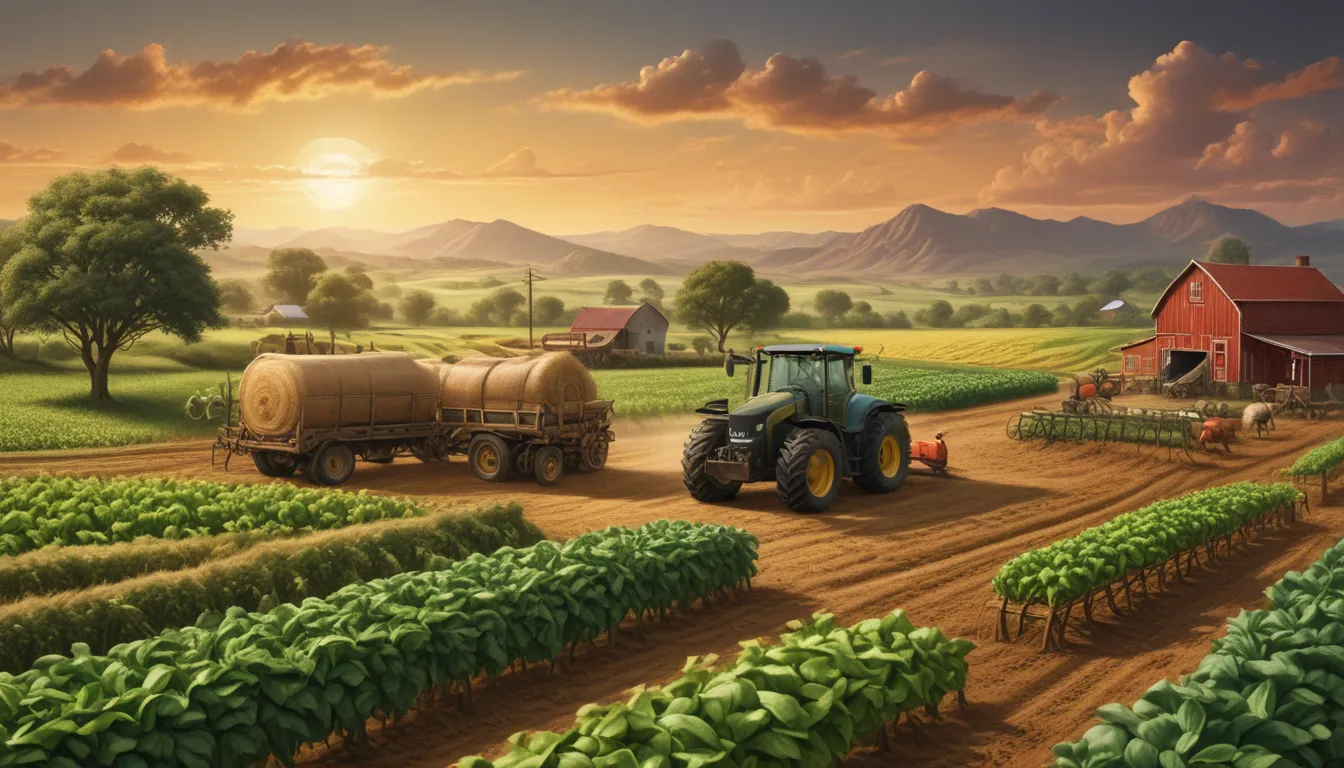A Note About Images: The images used in our articles are for illustration purposes only and may not exactly match the content. They are meant to engage readers, but the text should be relied upon for accurate information.
In a world where the global population is steadily increasing, ensuring access to safe, nutritious, and sufficient food for everyone has become a pressing concern. Food security and agriculture play crucial roles in the daily lives of individuals and the stability of nations. This article delves into 20 unbelievable facts about food security and agriculture, shedding light on the challenges we face and the innovative solutions being developed to overcome them.
Understanding Vertical Farming
- Vertical farming is a revolutionary technique that involves growing plants in vertically stacked layers, allowing increased crop yields in limited space.
- This method utilizes artificial lighting, temperature control, and hydroponics to create ideal growing conditions, enabling year-round crop production.
- Vertical farming is a cool way to cultivate food all year round, even in urban areas where space is limited.
The Vital Role of Bees in Crop Pollination
- Bees play a crucial role in pollinating many crops, including fruits, vegetables, and nuts.
- Without bees, the production of these crops would be significantly reduced, impacting food security and agricultural stability.
- It is essential to protect bees to ensure sustainable crop pollination and food production.
Sustainable Fishing for Protein Needs
- Over 1 billion people worldwide rely on fish as their primary source of protein.
- Sustainable fishing practices and maintaining healthy fish populations are essential for food security and meeting nutritional needs.
- Ensuring the sustainability of fish populations is crucial to provide a valuable source of protein for a significant portion of the global population.
Debates Surrounding GMOs in Agriculture
- The use of genetically modified organisms (GMOs) in agriculture is a controversial topic.
- Proponents argue that GMOs can enhance crop yields and increase resistance to pests and diseases.
- Opponents raise concerns about potential long-term effects on the environment, human health, and food security.
The Impact of the Green Revolution
- The Green Revolution in the 1960s transformed global agriculture by adopting high-yielding crop varieties and improved irrigation techniques.
- This revolution played a pivotal role in increasing agricultural productivity and reducing hunger worldwide.
- The adoption of innovative agricultural practices has led to significant improvements in food production and security.
Addressing the Threat of Climate Change
- Climate change poses a significant threat to food security due to changing climate patterns and extreme weather events.
- Adaptive strategies and sustainable practices are essential to ensure food security in the face of a changing climate.
- It is crucial to implement measures to mitigate and adapt to the impacts of climate change on agriculture.
Empowering Small-Scale Farmers
- Small-scale farmers, who contribute significantly to global food production, often work on small plots of land.
- Supporting and empowering these farmers is crucial for enhancing food security and reducing poverty in rural communities.
- Investing in small-scale agriculture can have a significant impact on improving food security and livelihoods.
Tackling Food Waste for a Sustainable Future
- Food waste is a major global issue that occurs at various stages of the supply chain, contributing to hunger and food insecurity.
- Addressing food waste not only reduces hunger but also has positive environmental implications.
- Implementing measures to prevent food waste can contribute to a more sustainable food system.
Embracing Urban Agriculture
- Urban agriculture, which involves cultivating crops and raising animals in urban areas, is on the rise.
- This trend aims to improve food security, promote sustainable living, and increase community engagement.
- Urban agriculture presents opportunities to enhance local food production and build resilient communities.
Balancing Benefits and Risks of Pesticide Use
- The use of pesticides in agriculture has both benefits and risks in protecting crops from pests and diseases.
- While pesticides can enhance crop yields and prevent losses, overreliance on them can have adverse effects on human health and the environment.
- It is essential to use pesticides judiciously and adopt sustainable pest management practices.
Harnessing the Power of Aquaponics
- Aquaponics is a sustainable farming method that integrates fish farming with the cultivation of plants in water.
- This symbiotic system allows for nutrient recycling and efficient resource utilization, making it environmentally friendly.
- Aquaponics offers a unique approach to food production that promotes sustainability and resource efficiency.
Empowering Women in Agriculture
- Women play a crucial role in agriculture globally, contributing to various aspects of food production.
- Empowering and supporting women in agriculture is instrumental in achieving food security and reducing gender inequality.
- Recognizing and valuing the contributions of women in agriculture can lead to improved food security and livelihoods.
Promoting Equitable Access to Nutritious Food
- Food security is not solely about production but also access and distribution, ensuring adequate availability of nutritious food for all individuals.
- Addressing issues such as income inequality, food affordability, transportation, and infrastructure is essential to overcome barriers to food access and distribution.
- Promoting equitable access to nutritious food is crucial in achieving food security and improving public health.
Integrating Agroforestry for Sustainable Land Management
- Agroforestry is a land-use system that combines the cultivation of trees with agricultural crops or livestock.
- This approach provides multiple sources of income, promotes biodiversity, and supports sustainable land management.
- Integrating agroforestry practices can help preserve soil health, conserve natural resources, and enhance food security.
The Challenge of a Growing Global Population
- The world’s population is projected to reach 9 billion by 2050, posing significant challenges in food production and distribution.
- Sustainable agricultural practices, innovation, and investments in research and development are essential to meet the growing demand for food.
- Addressing the needs of a growing population requires a concerted effort to ensure food security and sustainable development.
The Universal Impact of Food Insecurity
- Food insecurity affects both low-income and high-income countries, driven by factors such as economic inequalities, climate change, and inadequate food policies.
- Addressing food insecurity requires comprehensive strategies that consider social, economic, and environmental factors.
- Building resilience and promoting equity are essential in ensuring food security for all individuals and communities.
Embracing Precision Agriculture Technologies
- Precision agriculture involves the use of technologies such as GPS, remote sensing, and data analytics to optimize farm management practices.
- These technologies enable farmers to make precise decisions regarding irrigation, fertilization, and pest control, improving efficiency and sustainability.
- Embracing precision agriculture technologies can enhance productivity, reduce environmental impact, and promote sustainable farming practices.
Understanding the Interconnected Global Food System
- The global food system is interconnected, with production, distribution, and consumption linked on a global scale.
- Events such as extreme weather conditions, trade policies, and market fluctuations in one region can have ripple effects on food availability and prices worldwide.
- Recognizing the interdependence of the global food system is crucial in addressing challenges and promoting food security.
Promoting Sustainable Land Management Practices
- Sustainable land management practices, such as crop rotation, contour plowing, and agroforestry, are crucial for preserving soil health.
- These practices help prevent soil degradation, erosion, and nutrient loss, ensuring long-term food security and agricultural sustainability.
- Prioritizing sustainable land management can lead to healthy soils, increased agricultural productivity, and enhanced environmental conservation.
Preserving Genetic Diversity for Food Security
- Preserving and utilizing genetic diversity in crops is vital for enhancing their resilience to pests, diseases, and changing environmental conditions.
- Maintaining crop diversity is key to ensuring a stable and secure food supply for future generations.
- Recognizing the importance of genetic diversity in agriculture can contribute to building resilient food systems and promoting food security.
A Collaborative Effort for a Food-Secure Future
In conclusion, addressing the complex challenges of food security and agriculture requires a collaborative effort from policymakers, farmers, consumers, and the global community. By prioritizing sustainable practices, supporting small-scale farmers, reducing food waste, and promoting equitable access to nutritious food, we can work towards a more food-secure future for all individuals and societies.
Conclusion: Prioritizing Food Security and Agriculture
The issue of food security and agriculture is paramount in today’s world, with challenges ranging from climate change to the increasing global population. By promoting sustainable farming practices, investing in agricultural research and development, and supporting small-scale farmers, we can make significant strides towards achieving food security for all. Raising awareness about the importance of reducing food waste, improving storage and transportation systems, and implementing policies that prioritize nutrition are also essential steps in enhancing food security globally.
Ultimately, food security and agriculture are fundamental to the well-being of individuals and societies. By working together and taking collective action, we can overcome challenges and ensure a future where everyone has access to safe, nutritious food. Together, we can build a sustainable and food-secure world for generations to come.
FAQs: Exploring Food Security and Agriculture
- What is food security?
-
Food security refers to the availability, accessibility, and affordability of food for all individuals, ensuring they have enough nutritious food to lead healthy lives.
-
Why is food security important?
-
Food security is crucial as it is a basic human right that ensures everyone has access to safe and sufficient food for their well-being and productivity.
-
What are the main challenges to food security?
-
Challenges to food security include climate change, population growth, poverty, limited access to resources, conflicts, and political instability.
-
How can agriculture contribute to food security?
-
Agriculture plays a vital role in food security by producing enough food to meet the growing demand, providing employment opportunities, and helping alleviate poverty.
-
What can individuals do to support food security?
- Individuals can support food security by making sustainable food choices, reducing food waste, supporting local farmers, and advocating for policies that promote food security and sustainable agriculture.
Trustworthy Content for Engaging Learning
Our commitment to delivering trustworthy and engaging content is at the heart of what we do. Each fact on our site is contributed by real users, bringing diverse insights and information to ensure accuracy and reliability. Trust in our dedication to quality and authenticity as you explore and learn with us, contributing to a more informed and empowered global community. Together, we can make a difference in promoting food security and building a sustainable future for all.






